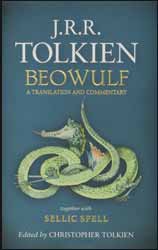|
Click here to return to the main site. Book Review
It is not at all surprising, given his professorship in Anglo-Saxon literature, that J. R. R. Tolkien would spend part of his academic life translating and teaching Beowulf, the oldest surviving old English poem, probably written between the 8th and 11th century. I emphasis English as The Epic of Gilgamesh is dated between 200 and 2500 BC and stands as the oldest surviving poem. The original was an illative poem, which is constructed around word groupings and relative emphasis on particular words and may look unusual to the modern eye. Many attempts have been made to update the poem, as the language is fairy indecipherable to anyone outside the field of academic study. In Beowulf: A Translation and Commentary (2014. 425 Pages) by J. R. R. Tolkien, edited by Christopher Tolkien, we are presented with Tolkien’s own attempt to bring the poem into the medium of modern English. Controversially, Tolkien chose not to keep the original poetic form, rather he translated the poem into prose form. The story tells of Beowulf, hero of the Geats, a Scandinavian warrior who comes to the aid of his neighbour, Hroðgar, the king of the Danes whose drinking hall has been attacked by the monster, Grendel. Mighty of arm, Beowulf first kills Grendel and then Grendel’s mother. Following his great victory he returns home to be crowned king, but many decades later he is forced to confront a dragon to his ruin. Although Tolkien did not publish the translation whilst alive, he did use it as the basis for lectures and the extensive note for these still exist. The book consists of the translation, note on the translation before we get to the professor's notes proper, in the form of a commentary. Although, interesting, I did find some of the text heavy going as the poem loses much when translated to prose. Where the prose version does score strongly is in Tolkien’s description of the three titanic fights which Beowulf undertook, imaginary, which would find itself into his own novels. The book, likewise, contains another couple of Tolkien’s original writings inspired by Beowulf: Sellic Spell and The Lay of Beowulf, with additional commentary. As a bit of Tolkien memorabilia the book has a place, however it is not the best translation of the poem. Likewise, and understandably, the book has more in common with an academic textbook than it does with a novel. 7 Charles Packer Buy this item online
|
|---|


